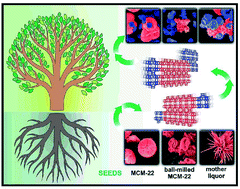Effect of different seed sources on the hydrothermal crystallization of MCM-22 zeolite catalysts†
Abstract
Zeolites are solid acids with several industrial applications, but usually their syntheses are difficult or costly and this negatively interferes in their use as catalysts or adsorbents. A seed-assisted approach is an alternative route to facilitating zeolite synthesis, shortening crystallization time, allowing template-free synthesis and decreasing costs and is environmentally friendly. In this study, the seed-assisted synthesis was applied to the MCM-22 zeolite. Three types of seeds were studied: the MCM-22, the ball milled MCM-22 and the micro-seeds in the mother liquor from an unseeded synthesis. XRD studies showed successful zeolite crystallization in shorter times, and SEM images pointed out a decrease in the crystal size, with the ball milled seed giving the best results. In the presence of seeds, the organic template was reduced up to 50%, but contamination with zeolite ZSM-5 was detected. The template-free synthesis did not lead to crystallization because in the synthesis of low Si/Al ratio zeolites, the interaction between aluminum and the template is needed for zeolite nucleation, as revealed by carbon and aluminum NMR. Due to the decrease in the crystal size, the seed-synthesized zeolites had an improved catalytic performance in liquid-phase glycerol condensation with acetone.



 Please wait while we load your content...
Please wait while we load your content...